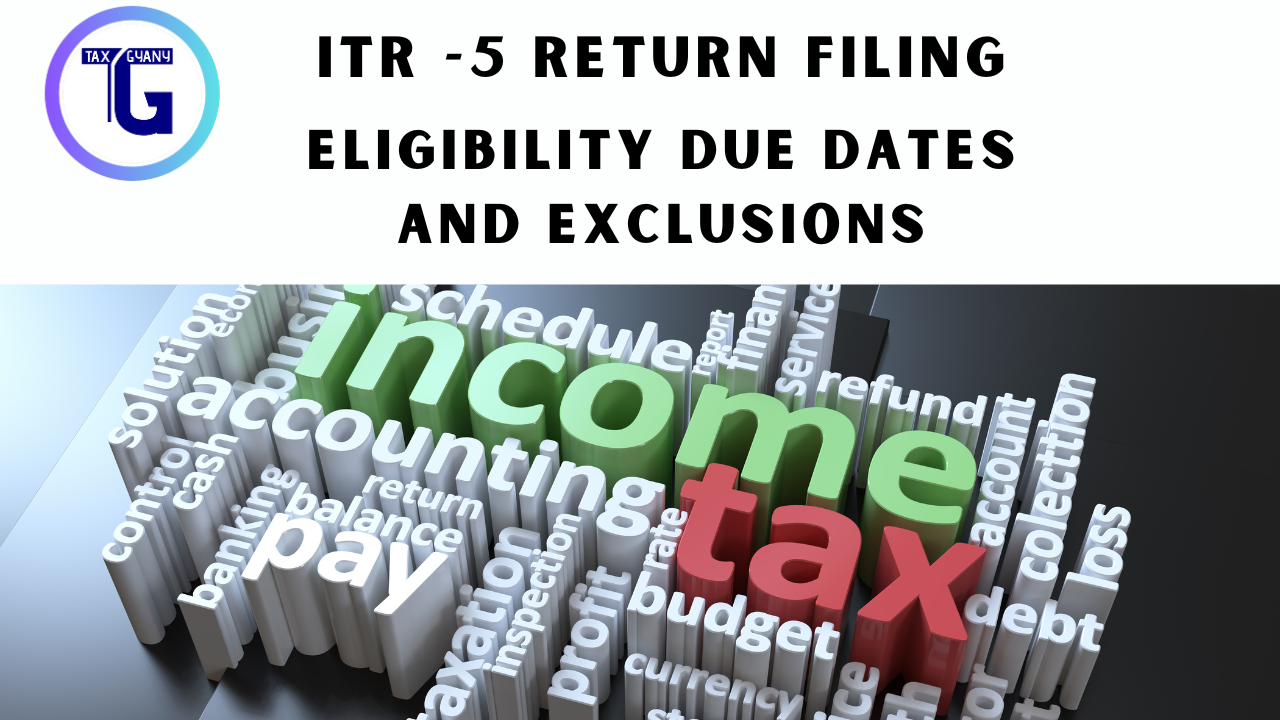ITR-5 Return Filing Eligibility Due Dates and Exclusions Filing Income tax returns is a crucial obligation for businesses and other entities, and selecting the appropriate ITR form is essential for accurate reporting and compliance. In this comprehensive guide, we delve into the details of ITR-5 return filing, covering eligibility criteria, due dates, and exclusions to provide clarity and guidance to taxpayers.
Understanding ITR-5 Form : ITR-5 Return Filing Eligibility Due Dates and Exclusions
What is ITR-5?
ITR-5 Return Filing Eligibility Due Dates and Exclusions ITR-5 is an Income Tax Return form primarily designed for firms, Limited Liability Partnerships (LLPs), Association of Persons (AOPs), and Body of Individuals (BOIs) other than those mentioned under ITR-1 to ITR-4. It is applicable to entities not eligible to file any other ITR form and have income from business or profession.
1. Applicability:
ITR-5 Return Filing Eligibility Due Dates and Exclusions ITR-5 is primarily used by entities such as firms, LLPs (Limited Liability Partnerships), AOPs (Association of Persons), BOIs (Body of Individuals), artificial judicial persons, and other entities, except those who are required to file their returns under ITR-7.
2. Income Sources:
ITR-5 Return Filing Eligibility Due Dates and Exclusions ITR-5 is suitable for entities with income from various sources, including business income, capital gains, house property, other sources, and income earned from other countries (if applicable).
Who is Eligible to File the ITR-5 Form?
Entities falling under the following categories are eligible to file the ITR-5 form:
ITR-5 Return Filing Eligibility Due Dates and Exclusions Firms: Including Limited Liability Partnerships (LLPs) and other partnership firms engaged in business or profession.
Association of Persons (AOPs): Groups of individuals or entities coming together for a common purpose other than business or profession, such as clubs, societies, or charitable organisations.
Body of Individuals (BOIs): ITR-5 Return Filing Eligibility Due Dates and Exclusions A group of individuals assessed as a single entity for income tax purposes, such as family members jointly owning assets or property.

Due Date for Filing ITR-5 Form
The due date for filing ITR-5 form for different categories of taxpayers is as follows:
For Individuals and HUFs: Generally, the due date for filing ITR-5 is July 31 of the assessment year.
For Entities Subject to Audit: In the case of firms, AOPs, and BOIs required to get their accounts audited under any law, the due date for filing ITR-5 is typically September 30 of the assessment year.
Who Cannot File the ITR-5 Form?
Exclusions from ITR-5 Filing
While ITR-5 is suitable for a specific set of entities, certain categories are excluded from filing this form. These include:
Individuals and HUFs: Individuals and Hindu Undivided Families (HUFs) engaged in business or profession should opt for other applicable ITR forms such as ITR-3 or ITR-4.
Companies: Companies registered under the Companies Act, including private limited companies and public limited companies, are not eligible to file ITR-5 and should use the relevant form prescribed for companies.
Trusts and Charitable Institutions: Trusts, charitable institutions, and other entities registered under specific provisions of the Income Tax Act may have separate ITR forms applicable to them based on their nature and activities.
Individuals/HUFs Having Income from Proprietary Business:
Individuals or Hindu Undivided Families (HUFs) having income from proprietary business or profession cannot use ITR-5. They are typically required to file returns using ITR-3 or ITR-4, depending on the turnover and nature of their business.
Individuals/Entities Required to File under ITR-7:
Any individual or entity required to file their returns under ITR-7, which includes entities falling under Sections 139(4A), 139(4B), 139(4C), or 139(4D) of the Income Tax Act, cannot use ITR-5.
Individuals/HUFs Having Capital Gains/Income from Other Sources:
Individuals or HUFs having income from capital gains, income from other sources, or multiple sources of income are ineligible to file using ITR-5. They should use relevant forms like ITR-2 or ITR-3, depending on the nature of their income.
Conclusion
In conclusion, understanding the eligibility criteria, due dates, and exclusions associated with ITR-5 return filing is crucial for entities required to comply with income tax regulations. By selecting the appropriate ITR form and filing their returns timely, taxpayers can fulfill their tax obligations effectively and avoid penalties.
Sources : https://www.incometax.gov.in/iec/foportal/
For More Information :https://taxgyany.com/

